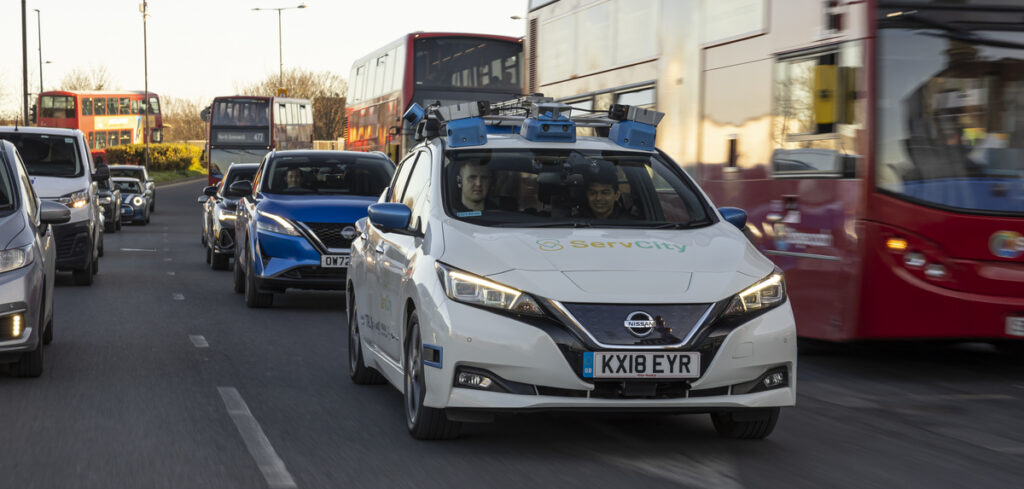The ServCity project – backed by Nissan and supported by the UK government – has deployed autonomous driving technology in London, integrated with the UK capital city’s infrastructure.
During a three-year research period, the consortium carried out 2,575 autonomous test kilometers and worked with Nissan on the development of a blueprint to help UK cities incorporate advanced autonomous vehicle technologies within city infrastructure. The project also investigated how cities could provide a robotaxi-style service in the future for residents and commuters.
The vehicle used for the autonomous trials was a 100% electric Nissan Leaf. The ServCity connected and autonomous vehicle (CAV) successfully completed validation trials on the roads of London while connected to the Smart Mobility Living Lab (SMLL) in Greenwich.
During the on-road tests, ServCity leveraged the full capabilities of SMLL – including a network of roadside sensors and a data processing suite to create a futuristic cooperative infrastructure environment – to send new sources of data to the CAV to improve its situational awareness. Furthermore, the infrastructure can detect objects that are not within the vehicle’s line of sight, such as objects around a corner or further ahead. This delivers advantages as it enables the vehicle to maneuver earlier to ensure smooth traffic flow.
The project will culminate in a series of demonstrations to stakeholders, during which guests will be able to experience the autonomous drive technologies integrated with CAV-ready infrastructure in Greenwich.
“We are extremely proud to be a part of the ServCity project, and our 100% electric Nissan Leaf has proved to be the ideal test vehicle,” said David Moss, senior vice president for region research and development at Nissan (Africa, Middle East, India, Europe and Oceania). “Through our Nissan Ambition 2030 long-term vision, we are committed to supporting greater access to safe and exciting mobility. Advancing our autonomous drive capability and expertise is critical to this effort, and research projects such as ServCity are vital to the evolution of technology.
“Through our world-class R&D base in Cranfield in the UK, Nissan is continuously innovating to bring cutting-edge, purpose-driven technologies that benefit our customers. ServCity’s achievements contribute to our efforts to usher in a future where we hope to see zero fatalities on the road while providing customers with the added comfort and convenience that come from advanced autonomous drive technologies.”
ServCity is part-funded by the UK government’s Intelligent Mobility fund administered by the Centre for Connected and Autonomous Vehicles (CCAV) and delivered by the UK’s innovation agency, Innovate UK. The consortium consists of six partners: Nissan, Connected Places Catapult, TRL, Hitachi Europe, the University of Nottingham and SBD Automotive.
“Not only has Nissan provided the 100% electric Nissan Leaf as a test vehicle, but our talented group of engineers has also contributed to the research and development of cutting-edge autonomous drive technology for use within the project,” explained Robert Bateman, manager of the Nissan Technical Centre Europe and Nissan project manager for ServCity. “This has enabled the development of a test vehicle that is able to autonomously navigate the busy streets of London alongside other road users – both stationary and moving – while connected with city infrastructure.
“With more than 115 people involved and almost 16,000 working days clocked up across the consortium during the lifetime of the project, ServCity represents an important step toward the future deployment of autonomous mobility.”
“The government has invested £7m [US$8.5m] in this project to be at the forefront of innovation,” said Transport Minister Jesse Norman. “Since then, ServCity has proved key to answering the practical questions of how to integrate self-driving vehicles into cities for the public good.”


